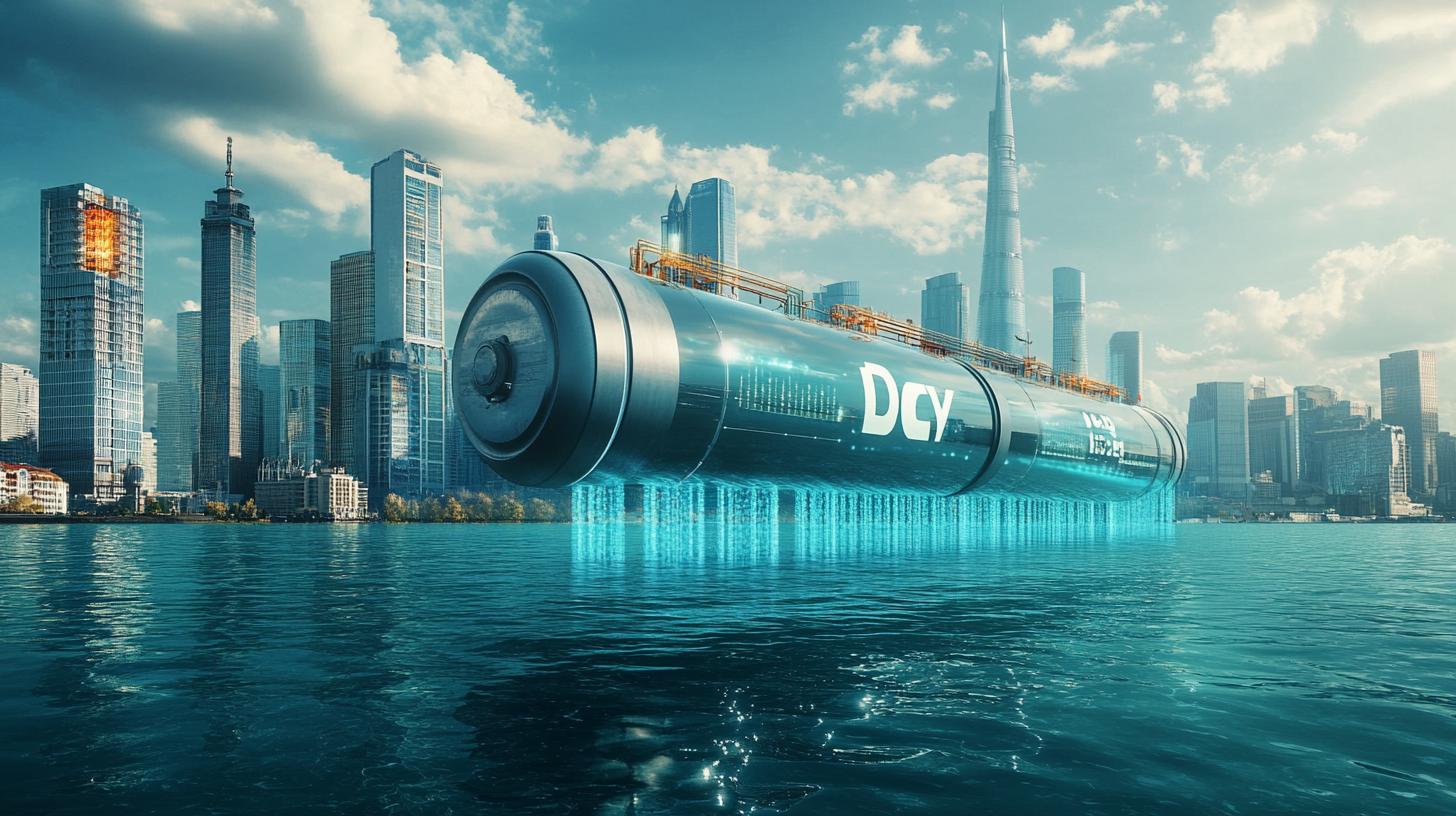- Germany is leading a transformation using green hydrogen to reduce industrial carbon footprints in sectors like steel, chemicals, and automotive.
- The national hydrogen strategy involves significant investments in infrastructure, such as electrolysis plants and pipelines.
- Germany’s international partnerships, notably with Norway and Australia, are crucial to ensuring a robust green hydrogen supply chain.
- The hydrogen economy is creating new job opportunities, especially in technology, engineering, and chemistry, requiring specialized skills and knowledge.
- Specialist recruitment consultants play a key role in sourcing the talent needed to propel the hydrogen sector forward.
- Germany’s bold approach is not just adapting to the energy transition but leading it, aiming to meet ambitious climate objectives.
- The success of this revolution relies on fostering talent equipped to navigate and innovate within the hydrogen economy.
Europe’s engines of industry are getting a makeover, and the catalyst is as small as an atom. Germany is at the forefront of a vast transformation, chasing the promise of hydrogen to revolutionize its economy. Like a skilled alchemist, the country aims to turn an age-old element into the golden solution for a sustainable future.
Green Hydrogen: The New Industrial Elixir
Imagine a sprawling steel plant, once a symbol of soot and smoke, now humming with the clean rhythm of green hydrogen. This vision could soon become reality as companies in Germany and beyond embrace this gaseous marvel to slice through their carbon footprints. For industries long shackled by their emissions—steel, chemicals, and automotive—the stakes are high, and hydrogen offers a lifeline.
Paving the Path with Infrastructure and International Partnerships
Building this brave new world demands more than dreams; it requires massive investment and innovation. Germany is leaving no stone unturned, with its government sculpting a national hydrogen strategy designed to make the country a beacon of hydrogen excellence. The landscape is being reshaped by electrolysis plants, extensive hydrogen pipelines, and sophisticated storage systems.
Yet, the vision doesn’t stop at the borders. Germany’s quest for hydrogen includes transnational partnerships with energy-rich nations like Norway and Australia, enriching its green hydrogen supply chain and ensuring a steady flow of this coveted resource.
New Jobs for a New Energy Era
As hydrogen weaves its way through the heart of Germany’s economy, the job market is pulsating with fresh opportunities. This new energy epoch demands skilled artisans of technology, engineering, and chemistry. It’s a call to arms for expertise, where seasoned professionals in traditional roles may find themselves students in the hydrogen schools of thought.
Companies, once content with conventional talent, are now setting their sights on those with the knowledge and vision to forge ahead in uncharted territory. Yet, as with any treasure hunt, the most precious resources are often the hardest to uncover.
Headhunters: The Quest for Expertise
Enter the experts who navigate the labyrinthine corridors of talent acquisition. Specialist recruitment consultants are the unsung heroes in this saga, meticulously seeking and securing the right minds to steer the hydrogen ship forward. Their networks are the secret maps to industry gold—deep, extensive, and invaluable.
A Future Fueled by Hydrogen
As the hydrogen economy gathers momentum, it stands poised to reshape not just landscapes, but livelihoods. Propelled by innovation and collaboration, Germany is not just keeping pace with the energy transition—it is setting the tempo. For companies, this evolution doesn’t just open doors to new markets but fortifies their journey toward ambitious climate goals.
The challenge now lies in cultivating the bright minds ready to herald this hydrogen revolution. With the right talent and tools, Germany’s industries can thrive in a competitive, carbon-conscious world, proving that sometimes, the smallest elements can create the most monumental changes.
Why Hydrogen is Set to Revolutionize Germany’s Industrial Landscape
Green Hydrogen: The Future of Sustainable Industry
Green hydrogen is poised to transform not just Germany but economies worldwide, offering a cleaner alternative to fossil fuels for energy-intensive industries. This transformation of traditional sectors such as steel, chemicals, and automotive industries is critical for reducing carbon emissions and achieving sustainability goals.
Key Benefits of Green Hydrogen
1. Reduction in Carbon Emissions: By replacing fossil fuels with green hydrogen, industries can significantly cut their carbon footprints, contributing to global efforts against climate change.
2. Energy Security: Hydrogen, easily produced through electrolysis using renewable energy, provides a consistent and reliable energy source, reducing dependency on fossil fuel imports.
3. Versatility: Hydrogen is not just a fuel but can also be used as an industrial feedstock, offering diverse applications from transportation to power generation.
How to Integrate Hydrogen into Industrial Processes
1. Invest in Electrolysis: Establishing electrolysis plants powered by wind or solar energy to produce hydrogen.
2. Upgrade Infrastructure: Create a dedicated hydrogen transport and storage network to ensure a steady supply chain.
3. Develop Conversion Technologies: Implement technologies that allow hydrogen to be used efficiently in industrial applications, like hydrogen-fueled furnaces.
Collaborative Efforts and Partnerships
Germany’s transition into the hydrogen economy isn’t insular. It involves a series of strategic international partnerships:
– With Norway and Australia: These partnerships help secure hydrogen imports and technology exchange.
– Research Collaborations: German institutions are collaborating with global researchers to innovate and improve hydrogen technologies.
Job Creation and Economic Impact
The hydrogen economy is a significant job creator:
– Skill Development: There’s a high demand for skilled workers knowledgeable in hydrogen technologies, creating opportunities for education and retraining.
– New Roles: The industry is seeing new roles in project management, engineering, and environmental sciences, providing a plethora of job opportunities.
Challenges and Limitations
While the benefits are immense, challenges remain:
– High Initial Costs: The cost of setting up infrastructure and technology for hydrogen production and storage is considerable.
– Energy Consumption: Hydrogen production via electrolysis can be energy-intensive unless powered by renewable sources.
– Developing Standards: Establishing safety and operational standards for hydrogen use is essential but still an ongoing process.
Market Trends and Future Outlook
– Rising Investments: Analysts predict that investments in hydrogen infrastructure will grow exponentially over the next decade.
– Government Incentives: Policies and subsidies are being rolled out to promote hydrogen use and offset initial costs.
Pros and Cons Overview
Pros
– Environmentally friendly and sustainable.
– Reduces dependency on fossil fuels.
– Supports economic growth through job creation.
Cons
– High initial capital investment.
– Infrastructure challenges.
– Energy-intensive production processes unless renewables are used.
Actionable Recommendations
– Government Policies: Encourage governments to implement supportive policies for renewable-powered electrolysis.
– Corporate Strategies: Companies should create teams to explore and implement hydrogen applications within their processes.
– Public Awareness: Increase awareness about benefits and opportunities in the hydrogen sector, encouraging educational institutions to focus on hydrogen-related curricula.
For more about what Germany is doing in the field of green energy, visit the Germany Mission to the United States.
Germany leads the charge into a hydrogen-driven future, a path paved with innovation and global collaboration. Investing in hydrogen is not only an environmental imperative but an economic opportunity waiting to be harnessed.











